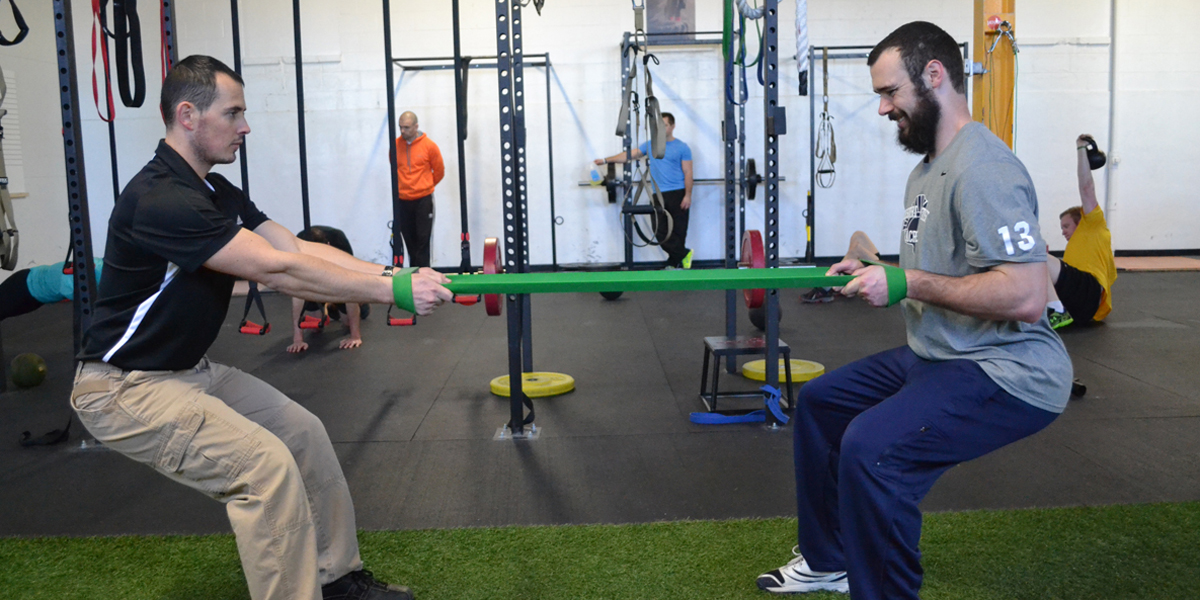When it comes to being physically fit, it’s always beneficial to have a proper knowledge of what to do to achieve your fitness goals. Victor Kizer offers five suggestions to toning up and staying healthy.

Photo by: Jeffrey Jones
__________________________________________________
Although there are many different desired levels of physical fitness, there are still a few basic fundamentals everyone should know. Missouri Baptist University graduate and adjunct instructor of Principles of Human Performance, Victor Kizer has shared his top five tips for staying fit.
Kizer, 31, graduated August 2013 from MBU with a bachelor of science in exercise science and is currently pursuing his master of science in fitness management.
He is certified through the National Strength and Conditioning Association and National Academy of Sports Medicine and is the co-owner of Defining Natural Ability, which is a functional training center in downtown St. Louis.
SUPPORT NETWORK
Starting at the top of Kizer’s list of fitness tips, he recommends the most necessary element for achieving your fitness goals is having a social support network, especially when it comes to conquering bad habits.
As humans, we have routines and habits that help us function throughout everyday life, but sometimes those habits can be our worst enemy.
“It only takes 21 days to create a habit, but this can feel like an eternity if you are out of your comfort zone,” said Kizer.
“We need to remember that you cannot simply quit a bad habit (poor eating, sedentary lifestyle); you have to replace it with a good one,” said Kizer. “Social support helps to provide the encouragement as you set out on your wellness journey and is vital when the going gets tough.”
CONSISTENCY and ACCOUNTABILITY
Kizer’s second nugget of wisdom — having consistency and accountability — comes in handy
when the trials along your fitness journey get tough.
“The reason that accountability is important is because you are never going to achieve your goals if you are not maintaining accountability to something,” said Kizer.
According to Kizer, if you are the type of person who gets off work at 6 p.m. and finds the couch more appealing than doing your workout, then it’s a good idea to have someone keep you on track.
“Having accountability, whether it be themselves or a training partner, ensures that they do what they are supposed to do, to ensure they are going to reach the goals that they have set for themselves,” said Kizer.
Also, having consistent behavioral goals will help you tremendously when trying to achieve your outcome goals.
You may have an objective of looking good for summer and to achieve this objective you have to set an outcome goal for yourself of losing 25 pounds in three months.
If you are just beginning to seek a higher level of fitness, these behavioral goals could be as simple as making sure you eat a balanced breakfast at a specific time each morning or
choosing to workout weekdays at 4 p.m. for 30 minutes each day.
Small stepping stones are the key to climbing the larger mountains.
It’s good to make these goals specific and achievable to keep yourself from getting discouraged and one of the best behavioral goals you can set for yourself is getting the proper amount of rest, which brings us to Kizer’s third tip.
QUALITY REST
From Kizer’s research and experience he has found that getting the seven to eight hours of sleep each night covers issues dealing with health, wellness, mental focus, hormonal imbalances in our body and even depression.
“Rest is when our body recuperates; it doesn’t matter what you feed your body or how much exercise you do, if you do not rest you will not repair,” said Kizer.
According to the National Sleep Foundation people should make getting the appropriate amount of sleep each night a priority and it should be something that we stop and do, not just the thing we do after everything else is done.
NUTRITION
Kizer’s No. 4 is nutrition.
“No one should ever tell you that you have to get rid of everything that you love in life, but you need to make sure that the things that you do enjoy you enjoy in small quantities or in moderation,” said Kizer.
He lives by the nutritional mantra of “enjoyment through moderation” and the knowledge that nutrition is more important to how we look than physical activity, because you cannot train on a poor diet.
“Nutrition affects everything within your body, from performance, to recovery, to hormonal imbalance,” said Kizer.
EXERCISE
This well-seasoned fitness expert’s final fitness tip is exercise often.
According to Centers for Disease Control and Prevention, also known as CDC, there are two types of physical activity adults need each week to improve your your health, aerobic and muscular-strengthening.
The CDC recommends adults need at least two hours and 30 minutes (150 minutes) of moderate-intensity aerobic activity and/or 1 hour and 15 minutes (75 minutes) of vigorous-intensity aerobic activity as well as muscular strength training on two or more days per week that target major muscle groups.
According to the CDC, the good news is you do not have to do all of this at once; 10 minutes a day is fine, as long as you are meeting the above criteria.
“People just need to be active as often as physically possible,” Kizer said. “That doesn’t necessarily have to mean putting on your tennis shoes and going out for a run or a bike ride, it doesn’t have to be going to the gym and lifting weights.”
So, if you are looking forward to a summer trip to a balmy beach destination, a summer cruise vacation, or are wanting to make an extraordinary impression at your upcoming class reunion, try Kiser’s five fitness tips.